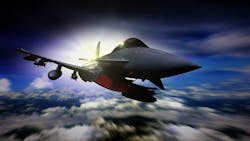United Technologies Boosts Outlook Again, Powered by Aerospace
United Technologies Corp. boosted its annual profit forecast for the second time this year, reaping continued strength in the aerospace market and buoying Chief Executive Officer Greg Hayes’s plan to reorganize the company around aviation and defense.
Adjusted earnings will be $7.90 to $8.05 a share this year, up from a previous expectation of at least $7.80, the company said Tuesday as it reported second-quarter results. Analysts had been anticipating $7.97 a share, according to the average of estimates compiled by Bloomberg.
The revised forecast, combined with higher sales in the aerospace division, lifts United Technologies as Hayes prepares to spin off the elevator and air-conditioner operations and merge with weapons maker Raytheon Co. The sweeping transformation comes on the heels of United Technologies’ acquisition of partsmaker Rockwell Collins.
“Everything continues to be on track with all of the portfolio separations activities,” Hayes said on a conference call with analysts. “We will get this done and we’re confident by the early part of next year we’ll be ready to go with the spins.”
The shares climbed 1.4% to $134.87 at 9:58 a.m. in New York. United Technologies had advanced 25% this year through Monday but less than 1% since the Raytheon deal was announced June 9.
Sales in the Collins Aerospace and Pratt & Whitney jet-engine segments each rose 9% in the second quarter on an organic basis, which strips out the effects of currency changes or acquisitions. The company said it saw “softness” in the end markets served by the Carrier heating and air-conditioning business.
Aerospace Sales
United Technologies cited particular strength in the aerospace commercial aftermarket, which boosted sales 16%, and military engine business, which was up 13%.
The company plans to expand its defense portfolio with the Raytheon deal, tapping into a foreign sales boom that has benefited market leader Lockheed Martin Corp. The world’s largest defense company raised its 2019 profit and sales forecasts Tuesday while reporting earnings that beat expectations.
The performance of Lockheed’s missiles and fire control division was particularly strong, with sales growing 16% in the quarter after the company won a $2.5 billion order to supply THAAD interceptors and equipment to Saudi Arabia and the U.S. government. Lockheed is “firing on all cylinders,” Douglas Rothacker, a Bloomberg Intelligence analyst, said by email.
Raytheon reports quarterly results July 25.
Upward Revisions
Upward revisions to the forecast have become routine for United Technologies, which raised the outlook last quarter and did so with the 2018 guidance several times last year. While the latest revenue outlook was unchanged, the company raised its expectation for organic sales growth to no less than 4% from at least 3%.
The improvement “is encouraging in light of investor concerns” over the Raytheon deal, Barclays Plc analyst Julian Mitchell said in a note. The prospective tie-up has drawn fire from activist shareholders Bill Ackman and Dan Loeb, who questioned the rationale.
United Technologies’ adjusted profit rose to $2.20 a share in the quarter, topping the $2.05 average of analysts’ estimates compiled by Bloomberg. Sales climbed 18% to $19.6 billion. Analysts had predicted $19.5 billion.
Like virtually every supplier in the commercial aviation market, United Technologies is affected by the troubles facing Boeing Co.’s 737 Max, which has been grounded since March following a pair of fatal crashes.
United Technologies, which makes parts for the plane as well as an engine for a rival jet, has said that it expected a 10-cent headwind if Max production rates remain low throughout this year.
By Richard Clough
About the Author
Bloomberg
Licensed content from Bloomberg, copyright 2016.
